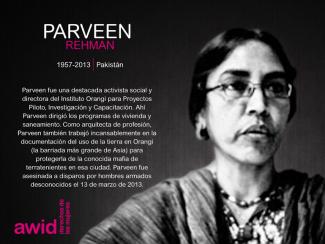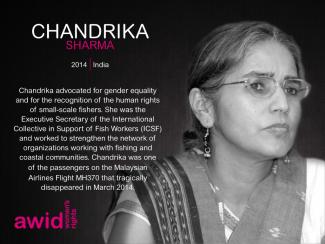
Chandrika Sharma

Young feminist activists play a critical role in women’s rights organizations and movements worldwide by bringing up new issues that feminists face today. Their strength, creativity and adaptability are vital to the sustainability of feminist organizing.
At the same time, they face specific impediments to their activism such as limited access to funding and support, lack of capacity-building opportunities, and a significant increase of attacks on young women human rights defenders. This creates a lack of visibility that makes more difficult their inclusion and effective participation within women’s rights movements.
AWID’s young feminist activism program was created to make sure the voices of young women are heard and reflected in feminist discourse. We want to ensure that young feminists have better access to funding, capacity-building opportunities and international processes. In addition to supporting young feminists directly, we are also working with women’s rights activists of all ages on practical models and strategies for effective multigenerational organizing.
We want young feminist activists to play a role in decision-making affecting their rights by:
Fostering community and sharing information through the Young Feminist Wire. Recognizing the importance of online media for the work of young feminists, our team launched the Young Feminist Wire in May 2010 to share information, build capacity through online webinars and e-discussions, and encourage community building.
Researching and building knowledge on young feminist activism, to increase the visibility and impact of young feminist activism within and across women’s rights movements and other key actors such as donors.
Promoting more effective multigenerational organizing, exploring better ways to work together.
Supporting young feminists to engage in global development processes such as those within the United Nations
Collaboration across all of AWID’s priority areas, including the Forum, to ensure young feminists’ key contributions, perspectives, needs and activism are reflected in debates, policies and programs affecting them.

Les Forums de l’AWID ont toujours été des espaces où les difficiles mais nécessaires conversations ont lieu. Nous accueillons ces propositions dès lors que la personne ou organisation qui la suggère garantit un espace à la fois respectueux et sûr pour celles et ceux qui y prennent part.
5 pm, tonight.


The handwriting on the invitation—
coily and brusque—
I’ve seen it five times in five years.
My body rouses,
feverish.
I need to fuck myself first.
The tide is high tonight and
I get
off.
I want to slow everything down,
taste time and space, etch them
into memory.
*
I’ve never been to this part of town before.
Unknown places excite me,
the way limbs and veins and bones
resist decay,
their fate uncertain.
At the door, I think twice.
The hallway is pitch black
and it makes me pause.
On the other side,
a portal of smell and color
opens like a curse,
into a sunny afternoon.


The breeze
makes my hair dance,
piques its curiosity,
compels it to move.
I hear the wheelchair whirring,
shaping the shadows.
Then I see them:
a lynx face
and a body like mine
and I find myself desiring both
again.
The creature motions me closer.
Their gestures write a sentence;
as I move toward them,
I notice its details:
wither, flesh, bliss
On their command, the vine that covers the hallway
hugging warm stones,
snakes up the wall.
It becomes a verb,
“to climb,”
and I’m reorientated when their claws point
to the vine-bed in the center.
I hear the wheels behind me,
then that sound.
It reverberates
like no other.
Their long black wings
elevate toward the ceiling
then they lunge forward.
The feline vision scans every detail,
every change,
every longing.
Can desire liquefy your muscles?
Can it act sweeter than the strongest
of tranquilizers?


A lynx sews the world
across our differences,
weaving lace around my knees.
Can desire crush the distance of the world,
compressing the seconds?
They come closer still,
lynx eye meeting human eye,
sniffing the air,
turning body into
urgency.
They beat down their wings.
Stirred,
the vines tangle around my waist/waste.
Their tongue thins time,
shifting grounds,
soothes, with their magic,
what stirs beneath.
I see the world in you, and the
world is exhausted.
Then they plead:
Let me feast on you.




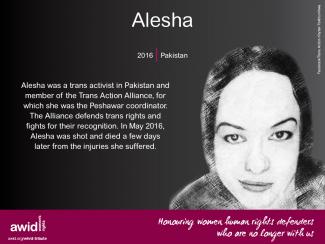
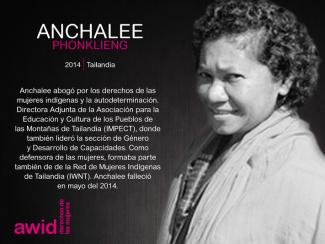
Ce qui m’a aidée, c’est que j’adorais le travail qui consiste à aller dans les terres et à documenter les connaissances des gens. Donc j’ai quitté le confort...

El creciente poder de los actores anti-derechos no se está desarrollando en un vacío. Entender el auge del ultranacionalismo, del poder corporativo irrestricto, del incremento de la represión y de la disminución del espacio cívico resulta clave para contextualizar las amenazas anti-derechos que enfrentamos actualmente.

Hoy en día, una cantidad considerablemente mayor a la mitad de la población mundial está gobernada por líderes de extrema derecha. En este escenario, lxs defensorxs de derechos humanos y lxs feministas están trabajando arduamente para «mantenerse firmes» y proteger el multilateralismo y el sistema internacional de derechos humanos. También enfrentan el riesgo de que su compromiso acarree represalias violentas. Al mismo tiempo, estas instituciones están cada vez más sujetas a los intereses del sector privado. Las grandes empresas (en particular, las corporaciones transnacionales) están ocupando asientos en la mesa de negociación y posiciones de liderazgo en una gran cantidad de instituciones multilaterales, incluida la ONU. Este nexo de ultranacionalismo, espacio cívico restringido y captura corporativa está teniendo un tremendo impacto sobre la posibilidad de que, alguna vez, logremos obtener derechos humanos para todxs.
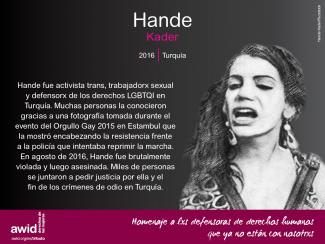
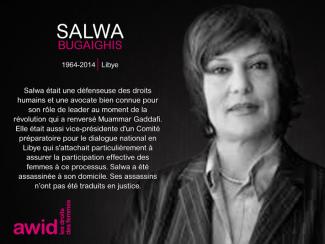
بالنسبة إليّ، هذه الأنواع من الدردشات كانت ضمن تعابير الحبّ التي أتاحت لي الحياة أن أستمتع بها حديثًا فقط. ما كنت أعرف أن هذه الأشكال الأخرى ممكنة – تلك التي توجَد خارج نطاق ورشات العمل، أو أماكن الناشطين أو غرف الصفّ أو أماكن العمل.
Alors que les fondamentalismes, les fascismes et autres systèmes d’oppression se métamorphosent et trouvent de nouvelles tactiques et stratégies pour consolider leur pouvoir et influence, les mouvements féministes persévèrent et célèbrent leurs victoires nationales, régionales et internationales.

La [MB1] reconnaissance en 2019 par le Conseil des droits de l’Homme du droit à l’intégrité et à l’autonomie corporelles, par exemple, a marqué une étape cruciale. Des résolutions du Conseil sur la discrimination envers les femmes et les filles admettent cependant un recul lié à des groupes de pression rétrogrades, des conceptions idéologiques ou un détournement de la culture ou la religion pour s’opposer à l’égalité de leurs droits. Des avancées féministes sont aussi notées dans le travail des Procédures spéciales, qui soulignent notamment l’obligation des États de contrer les doctrines de l’idéologie du genre, rappellent à l’ordre les antidroits qui détournent des références à la « culture », et signalent que les convictions religieuses ne peuvent pas servir à justifier la violence ou la discrimination.
Contenu lié
Front Line Defenders: Assassinat de Ruth Alicia Lopez Guisao
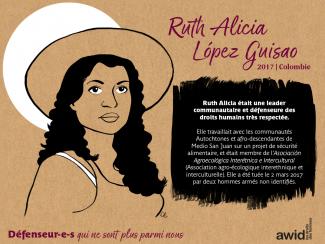

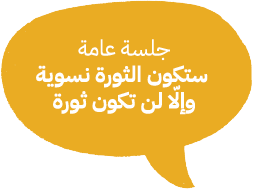
جلسة عامة | ستكون الثورة نسوية وإلّا لن تكون ثورة
مع منال التميمي وبوبولينا مورينو وكارولينا فيكيفيتش وأنووليكا نوجوزي أوكونجو
 |
Hind et Hind étaient le premier couple queer documenté dans l’histoire arabe. Dans le monde d’aujourd’hui, iel est un·e artiste queer du Liban. |

À l’âge de six ans, j’appris que mon grand-père avait un cinéma. Ma mère me raconta comment il l’avait ouvert au début des années 1960, quand elle avait également à peu près six ans. Elle se rappelait qu’il avait projeté La Mélodie du bonheur le soir de l’ouverture.
Je passais au cinéma tous les week-ends et regardais mon grand-père jouer au backgammon avec ses amis. Je ne savais pas qu’il vivait là, dans une pièce située juste en dessous de la cabine de projection. J’appris plus tard qu’il y avait emménagé à la suite de la séparation d’avec grand-mère, et de la fermeture du cinéma dans les années 1990, peu après la fin de la guerre civile libanaise.

Pendant des années et jusqu’à son décès, je voyais généralement mon grand-père jouer au backgammon à l’accueil du cinéma, qui n’était plus du tout entretenu. Ces scènes à répétition sont mes seuls souvenirs de lui. Je n’ai jamais vraiment appris à le connaître – on ne parlait jamais de cinéma, malgré qu’il ait passé tout son temps dans un cinéma en déperdition. Je ne lui ai jamais demandé ce que ça faisait de vivre dans un lieu comme celui-là. Il est mort quand j’avais 12 ans, le soir de Noël, d’une chute dans l’escalier en colimaçon qui montait jusqu’à la cabine de projection. C’est presque poétique qu’il soit mort en mouvement, dans une maison où les images en mouvement sont perpétuellement suspendues dans le temps.

Au printemps 2020, mon cousin m’a appelée pour me dire qu’il avait nettoyé le cinéma de mon grand-père et me demandait de le retrouver là-bas. Tous les deux, nous avions toujours rêvé de remettre le cinéma sur pied. J’arrivai sur place avant lui. À la réception, des cadres d’affiches étaient toujours accrochés aux murs… mais les affiches avaient disparu. Je savais qu’il devait rester des souches de places de ciné quelque part. Je les ai toutes trouvées dans une petite boîte en fer, sur une étagère derrière le bureau de l’accueil, et j’en ai profité pour en glisser quelques-unes dans ma poche.
Je commençai à me promener dans le ciné. Sur la scène principale, l’écran de projection était plutôt sale et quelque peu abîmé sur les côtés. Je passai mon index sur l’écran pour enlever une couche de poussière, et remarquai qu’il était toujours bien blanc en dessous. La toile semblait également en bon état. Je levai la tête pour voir si les rideaux de ma grand-mère, faits de satin blanc et arborant un petit emblème en lisière à l’effigie du cinéma, étaient toujours en place. Dans la pièce, il y avait une salle basse, une salle principale et un balcon. Les chaises semblaient vraiment très usées.
Je remarquai le projecteur qui dépassait d’une petite fenêtre à l’extrémité des places au balcon. Je gravis les marches en colimaçon jusqu’à la cabine de projection.
La pièce était sombre mais une source de lumière provenant des fenêtres poussiéreuses tombait sur une pile de bobines de films dans un coin. Des bandes de celluloïde sans vie gisaient emmêlées au pied du projecteur. Les bobines poussiéreuses étaient toutes des westerns, des films de Bollywood et de science-fiction, avec des titres horribles comme La Météorite qui détruisit la Terre, ou d’autres du même genre. Certaines d’entre elles attirèrent mon attention, et notamment de petites bandes de pellicule. Une par une, les bandes montraient différentes scènes de baisers, des danses suggestives, une vague scène de rassemblement, un gros plan d’une femme allongée bouche ouverte, le générique de début d’un film de Bollywood, et une étiquette « Actuellement à l’affiche » répétée sur plusieurs images.
Les génériques des films de Bollywood me rappelaient ma mère. Elle me racontait qu’on distribuait des mouchoirs aux spectateurs et spectatrices à la fin des projections. Je conservai les bandes avec les scènes de baisers et de danses suggestives, supposant qu’elles avaient été coupées pour des raisons de censure. Le gros plan sur la femme me rappela un extrait du film Visible Man de Béla Balázs, ou The Culture of Film, The Spirit of Film ou encore The Theory of the Film. Mon grand-père disait que les gros plans dans un film étaient comme un
soliloque silencieux, dans lequel un visage peut parler avec des nuances de sens les plus subtiles, sans sembler artificielles ni rappeler la distance des spectateurs. Dans ce monologue silencieux, l’âme humaine solitaire peut trouver une langue plus candide et désinhibée que tout soliloque parlé, car elle s’exprime instinctivement, subconsciemment.

Balázs décrivait surtout les gros plans de Jeanne dans le film muet La Passion de Jeanne d’Arc. Il remarquait combien « … dans le (cinéma) muet, l’expression faciale, isolée de son environnement, semble pénétrer une étrange nouvelle dimension de l’âme ».
J’examinai plus précisément la bande de pellicule. La femme semblait morte, son visage semblable à un masque. Cela me fit penser à l’Ophélie du peintre John Everett Millais. Dans son livre On Photography, Susan Sontag dit que la photographie est « une trace, quelque chose de marqué directement sur la bobine, comme une empreinte ou un masque mortuaire ». Ces masques mortuaires sont comme une présence qui rappelle une absence.
Je me souviens de ma rencontre avec un discours sur la mort et la photographie dans le film The Machine that Kills Bad People de Roberto Rossellini, tombé dans l’oubli. Dans ce film, un cameraman prend des photos de gens, qui sont alors figés, puis suspendus dans le temps. Le critique de cinéma français André Bazin disait que la photographie capture les corps hors du flux de l’amour et les conserve en les embaumant. Il décrivait cette momification photographique comme étant « la préservation de la vie par une représentation de la vie ».
Cette cabine de projection, sa disposition et toutes les choses qui semblaient avoir été déplacées, y compris les bandes de pellicules sur le sol, tout ce sur quoi mon grand-père avait laissé sa marque – je voulais absolument tout protéger.
Sous les bandes de pellicule reposait une bobine de film poussiéreuse intacte. On aurait dit que quelqu’un avait regardé le film en faisant dérouler la pellicule à la main. C’est à ce moment que mon cousin arriva en haut de l’escalier en colimaçon et me trouva en train de l’examiner. Se frottant le menton du bout des doigts, de manière très factuelle, il me dit : « Tu as trouvé le porno ».

J’observai la bande de film dans ma main et réalisai que ce n’était pas une scène de décès. La bande avait été coupée de la bobine d’un porno. La femme gémissait d’extase. Les gros plans servent à communiquer des sentiments d’intensité, d’extase, mais je n’avais jamais vraiment utilisé les théories de Balázs pour décrire une scène porno. Il écrivait « le paroxysme dramatique entre deux personnes sera toujours présenté comme un dialogue d’expression faciale en gros plan ». Je fourrai les bandes de films dans ma poche et donnai à la femme le nom d’Ishtar. Elle vit dans mon portefeuille depuis. Il semble étrange de comparer la représentation détaillée des peurs et du courage de Jeanne avec l’expression faciale orgasmique d’Ishtar.
D’après mon cousin, le frère de mon grand-père attendait que ce dernier ait quitté le cinéma et, au lieu de le fermer, il invitait ses amis à des projections privées. Je n’en pensais pas grand-chose. C’était une pratique courante, surtout pendant et après la guerre civile au Liban. Après la guerre, il y avait des téléviseurs dans presque tous les foyers libanais. Je me souviens même en avoir un dans ma chambre à la fin des années 1990, quand j’avais à peu près six ans. On m’avait dit que c’était courant d’acheter des films porno en cassette VHS à l’époque. Mohammed Soueid, un écrivain et réalisateur libanais, m’a dit un jour que les cinémas projetaient des films d’art et d’essai et de pornographie de la moitié des années 1980 à la moitié des années 1990, pour survivre. J’ai aussi entendu dire que les projectionnistes découpaient les bobines de films porno pour modifier les montages et pouvoir projeter quelque chose de différent chaque soir. Les gens sont finalement restés confortablement chez eux à regarder des cassettes VHS sur leur téléviseur, et les cinémas ont commencé à décliner.

Mon cousin redescendit pour consulter les archives administratives dans le bureau.
Je restai dans la cabine et commençai à faire glisser la bande entre mon index et mon majeur, la relevant avec les pouces pour faire lentement défiler les images entre mes mains. Je levai les mains pour capter la lumière de la fenêtre poussiéreuse et plissai les yeux pour tenter de deviner ce que cachaient les vignettes monochromes. Dans cette série d’images figurait un gros plan exagéré d’une bite plantée dans un vagin. L’image se répétait sur plusieurs cadres, jusqu’à ce que j’arrive à un nœud dans la bande, et que j’imagine le reste.


Hank exhibe son érection devant Veronika, couchée sur un lit à côté d’un faux secrétaire Louis XIV. Elle se lève lentement et fait glisser la fine bretelle de sa nuisette transparente de son épaule gauche. Hank dénoue sa robe de voile, la retourne, lui donne une claque sur les fesses et la pousse contre le secrétaire. Il enfonce sa bite dans sa chatte de manière répétée, alors que l’arrière du meuble frappe contre le mur tapissé.


Je fais toujours attention aux décorations intérieures depuis que mon enseignante en Études des femmes dans le porno m’a dit que les plus grandes archives de porno d’Amérique du Nord sont utilisées, de manière intéressante, pour examiner le mobilier de la classe moyenne de l’époque. Donc, alors que Veronika se penche et se fait prendre par derrière par Hank, une assistante en recherche universitaire pourrait tout aussi bien tenter de deviner le design du motif doré sur le secrétaire, ou étudier le relief rococo d’une chaise en bois dans un coin.
Pendant un moment, la cabine est devenue un espace d’imagination sexuelle féminine, perturbant un espace généralement promis à la liberté de la sexualité masculine. J’étais sûre que seuls les hommes pouvaient accéder aux cinémas qui diffusaient des films porno. La bobine de film était trop emmêlée pour pouvoir être démêlée dans une cabine de projection où la poussière s’accumulait depuis une décennie, donc je la fourrai dans mon sac de sport et sortis du cinéma.
Je ne sais pas ce qui m’a pris, mais je me suis sentie obligée de la garder. Je voulais ressentir l’excitation de garder quelque chose de mystérieux, quelque chose de non orthodoxe. Dans mon esprit, j’étais sûre que les gens savaient que je cachais quelque chose pendant que je descendais la rue. J’étais prise d’un sentiment de culpabilité mêlée de plaisir. Je me sentais perverse.

J’entrai dans la maison, préoccupée par le fait d’avoir une bobine de porno dans mon sac de sport et le fil de mes pensées qui s’était déroulé sur la route du retour à la maison. Je me dirigeai immédiatement vers ma chambre. Dans un coin un peu éloigné de mon esprit, je me suis rappelée que derrière mon mur se trouvait la chambre de Layla. Elle n’était probablement pas à la maison, mais la possibilité d’être entendue m’excitait. Je fermai la porte de ma chambre et sortis la bobine du film d’Ishtar.
Je l’imaginais habillée d’une légère robe en voile verte, dansant de manière suggestive devant moi, balançant ses hanches et me souriant du regard. Je m’allongeai sur mon lit et glissai mes doigts dans ma culotte. Soulevant mes hanches, je fis descendre ma main entre mes cuisses pour les écarter et glisser deux doigts à l’intérieur. Je me tendis en caressant mes plis chauds. Je gémis avant même de pouvoir m’arrêter. Je haletai et remuai mes reins. Les rayons de soleil qui entraient par la fenêtre me plaquaient des baisers sur la peau sans le vouloir. Je retenais mon souffle et mes membres tremblaient. J’avalai un cri et reposai à plat sur le matelas.

Quand j’étais en premier cycle à l’université, je suivais un cours d’Introduction au cinéma et la professeure, Erika Balsom, avait prévu une projection du Variety de Bette Gordon. J’étais excitée à l’idée de regarder le premier film de la productrice Christine Vachon, avant qu’elle ne se mette à produire des films qui font maintenant partie du mouvement du Nouveau cinéma queer. Variety était décrit comme un film féministe sur Christine, une femme qui commence à travailler à la billetterie d’un cinéma porno de New York appelé The Variety Theater. Christine peut entendre le son des films au cinéma, mais ne pénètre jamais dans les salles. Elle finit par s’intéresser à un client régulier, qu’elle observe de près. Elle le suit dans une boutique pour adultes où elle se tient à l’écart et feuillette des magazines pour adultes pour la toute première fois.
Le voyeurisme de Christine est affiché de différentes manières tout au long du film. Le script est également très chargé et contient des monologues érotiques qui seraient aujourd’hui considérés obscènes ou vulgaires.
Dans une scène qui se déroule dans une salle de jeux, elle lit de la littérature érotique à son copain. La caméra fait des allers-retours entre des gros plans des fesses de son copain Marc qui joue au flipper, faisant des mouvements de va-et-vient avec ses hanches contre le flipper, et un gros plan du visage de Christine qui lui récite son monologue.


« Sky fait du stop et est pris par une femme qui conduit une camionnette. Il est tard et il a besoin d’un endroit où dormir, elle lui propose donc de dormir chez elle.
Elle lui montre sa chambre et lui propose un verre. Ils boivent en discutant, puis décident d’aller se coucher. Ne parvenant pas à dormir, il remet son pantalon et traverse le hall jusqu’au salon. Il s’arrête avant de pouvoir être vu, mais il peut voir la scène. La femme est allongée nue sur la table basse, dont seules les jambes dépassent. Tout son corps est d’une blancheur excitante, comme s’il n’avait jamais été exposé au soleil. Ses mamelons sont d’un rose brillant, en feu, presque des néons. Ses lèvres sont entrouvertes. Sa longue chevelure de couleur châtain touche le sol; au bout de ses bras tendus, ses doigts caressent l’air. Son corps huilé est tout en rondeurs, sans angle ni os saillants. Glissant sur sa poitrine, un gros serpent entoure un de ses seins et descend contre le second. La langue du serpent lui lèche la chatte, si ouverte, si rouge dans la lumière de la lampe. Chaud et confus, l’homme retourne à sa chambre et, avec beaucoup de difficulté, parvient à s’endormir. Le lendemain matin, autour d’un bol de fraises, la femme lui demande de rester une autre nuit. Une fois encore, il ne parvient pas à dormir […] »

Quand j’avais 23 ans, Lynn, la fille de mon cours de cinéma avec qui je sortais, m’a prise par surprise en m’emmenant regarder des court-métrages érotiques le jour de la Saint-Valentin. L’événement avait lieu au Mayfair Theater, un vieux cinéma indépendant. L’architecture du cinéma rappelait les Nickelodéons d’Amérique du Nord, mais en plus vieillot. Ses balcons étaient décorés avec des cartons de Swamp Thing et d’Alien en taille réelle.
Cette année-là, le jury du festival était présidé par la star de cinéma pour adultes Kacie May, et le programme composé de court-métrages d’une heure et demie. Le contenu allait de courts-métrages soft sans machisme à des films scato fétichistes. Nous avons regardé quelques minutes de ce qui semblait être un porno hétérosexuel soft. Le film suivait un couple qui commence à faire l’amour dans un salon moderne, puis passe à la chambre. Il s’agissait surtout de scènes des deux en train de s’embrasser, se toucher et faire l’amour en position du missionnaire. Puis une femme avec un bob châtain entre dans leur lit, se léchant le dos de la main à petits coups de langue. Elle miaule et grimpe sur le couple, qui ne semblait pas y faire attention. Le couple continue à faire l’amour. Elle va alors jusqu’à la cuisine, ramasse son bol vide avec les dents et le dépose sur un coussin. Elle continue à faire des aller-retours jusqu’au couple pendant tout le reste du film. Cela semblait plutôt absurde. J’ai commencé à rire, mais Lynn avait l’air un peu mal à l’aise. J’ai alors regardé sur notre gauche et vu d’autres spectateurs et spectatrices se passer des bières et se gaver de pop-corn, tout en riant hystériquement. Leur rire ininterrompu et leurs commentaires à haute voix donnèrent le ton du festival. Regarder les spectatrices et les spectateurs est devenu plus intéressant que de regarder les films érotiques. Le Mayfair Theater projetait souvent des films culte, et regarder des films culte est une expérience de communion.
Ce n’est pas exactement la manière dont j’imaginais que l’oncle de ma mère regardait du porno au cinéma de mon grand-père. Les cinémas projetaient de manière évidente des films porno à l’époque, mais je ne pouvais imaginer cela se dérouler dans la ville de naissance de ma mère. Je l’imaginais regarder le film depuis le projecteur dans la cabine afin de pouvoir rapidement arrêter la projection en cas d’arrivée inopinée d’autres personnes. Ses amis prenaient place au balcon à l’arrière. Personne ne pouvait entrer à moins d’avoir la clé, donc ils étaient en sécurité. Ils devaient penser à tout. C’était un quartier chrétien conservateur et ils ne voulaient surtout pas causer d’ennuis. Ils étaient probablement dépassés par des sentiments d’excitation et de culpabilité. Les voix fortes de plaisanteries homoérotiques se mélangeaient à des gémissements et des râles, mais ils se rappelaient mutuellement de baisser le ton toutes les quelques minutes. Ils se relayaient à la fenêtre pour vérifier que les bruits ne pouvaient pas interpeller les voisins. Ils éteignaient parfois les haut-parleurs et regardaient sans le son.

Après une manifestation politique en 2019, je suis tombée sur un bouquiniste sur la rue Riad El Solh, près de la Place des martyrs dans le centre de Beyrouth. Au bout d’une des tables, passés les exemplaires d’Hugo et de Beauvoir, je trouvai une pile de romans érotiques et de magazines pour adultes. C’étaient des traductions de publications occidentales. J’en pris une vraiment au hasard; tout ce que je voulais, c’était détenir un exemplaire, juste pour le frisson. J’ai cherché celui avec la couverture la plus artistique.
En me rendant ma monnaie, le vendeur me demanda : « Je ne t’ai pas déjà vue quelque part? ». Il se mit à observer ma poitrine, descendant le regard plus bas. Il supposait probablement que je travaillais dans l’industrie du sexe ou du porno. Je le regardai bien dans les yeux et lui répondis que « Non ». Je fis demi-tour, prête à m’éloigner avec mon magazine. Il m’arrêta alors pour me dire qu’il avait beaucoup d’archives dans son sous-sol, et qu’il vendait régulièrement des collections et des publications de porno sur eBay, vers l’Europe et les États-Unis. J’aurais bien été intéressée à fouiller dans ses archives, mais je n’étais pas à l’aise et déclinai son offre. Je ne me sentais pas en sécurité. Je lui demandai où il trouvait ses romans. À ma grande surprise, ils étaient publiés au Liban.
En me dirigeant vers la statue de Riad El Solh, je parcourus la publication que j’avais achetée et trouvai le format du texte quelque peu démodé; les caractères de police étaient un peu flous, rendant le texte illisible. Les photographies à l’intérieur étaient faites de collages pornographiques aux couleurs passées. Ça paraissait assez cru; ça me plaisait. Le roman avait pour titre Les journaux intimes de Marcel.
La couverture était de manière évidente un découpage de magazines collés sur une feuille bleue. Sur l’image, une femme torse nu attrape la tête de son amant, enfonçant ses doigts dans ses cheveux, pendant qu’il lui embrasse le cou par derrière. La fermeture de sa jupe est entièrement descendue. Son amant à la main sur le bas de sa hanche droite. Sa main à elle est sur la sienne. Ses lèvres sont retroussées et entrouvertes, comme si elle gémissait de plaisir, ses cheveux blonds et raides à la mode des années 1970 descendant sur sa poitrine et couvrant partiellement ses mamelons.
J’ouvris la première page. La préface indiquait
ce qui se traduit par
« Désir
et débauche »
ou par
« Désir
et perversion »
Je lus le premier chapitre et réalisai que la personne qui avait traduit le texte avait changé le prénom du personnage principal en Fouad, un prénom arabe. Je supposai que l’idée était que le lectorat masculin libanais s’identifie à l’histoire. En continuant ma lecture, je réalisai que toutes ses amantes portaient des noms étrangers comme Hanna, Marla, Marcel, Marta.


Je réalisai à la page 27, chapitre quatre, que Marcel était un des amants de Fouad.

La scène avait lieu dans un cinéma. Les cinémas étaient souvent des espaces de liberté sexuelle en Amérique du Nord, et particulièrement depuis les années 1970, suite à la révolution sexuelle.
Je supposais également que tous les noms étrangers avaient été conservés pour donner une touche exotique au texte et le rendre moins tabou. La pornographie et l’érotisme étaient attribués à Hollywood, bien que le monde arabe ait de tout temps produit des textes érotiques. L’érotisme est devenu tabou, et la seule manière d’en produire sans danger est de le commercialiser comme un produit étranger, exotique.
Il est intéressant de noter comment l’exotique couvre l’érotique. La différence entre les deux adjectifs remonte à leur étymologie grecque respective : exotique vient de exo, « extérieur », qui signifie également autre, étranger; tandis qu’érotique est dérivé d’Éros, le dieu de l’amour sexuel. Donc, ce qui est exotique est mystérieux étranger – et ce qui est érotique est sexy.
Au Liban, la distinction entre l’exotique et l’érotique au cinéma est très ténue, tout comme la frontière entre films d’art et films porno. En 2015, lors d’une conversation avec la réalisatrice Jocelyne Saab dans un restaurant vietnamien de Paris, j’appris qu’elle avait dû tourner son film Dunia une deuxième fois pour modifier le dialecte égyptien en dialecte libanais. Elle me dit que ses acteurs et actrices étaient égyptiennes et égyptiens, et qu’elle n’était pas très stricte quant au script. Elle n’avait cependant pas le droit d’utiliser le dialecte égyptien. Le film devait être en libanais parce que les producteurs s’inquiétaient des scènes érotiques un peu limites dans le film. Ils en ont donc fait un film étranger.

